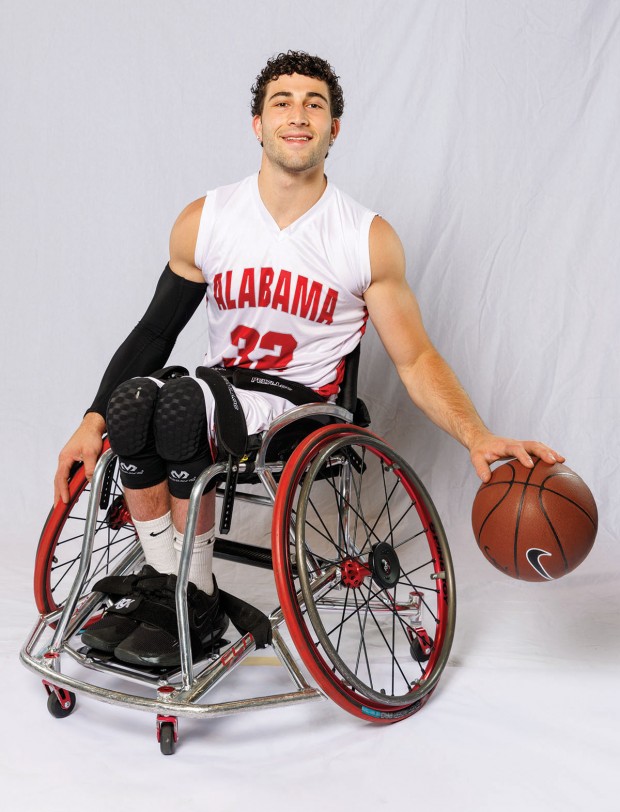Peter Berry
A star from the start

Peter Berry has always been a leader. Even as an elementary school-aged player in Post Oak Little League, people knew he was exceptional.
Back in 2011, Tommy Lamme, a Little League coach at the time, drafted Peter and his younger brother Aaron for the Post Oak Little League Aggies, the same team Tommy’s son Charlie was on. The boys had played football together previously, and Tommy says he knew the Berry boys were good competitors. “Peter was my first baseman, which is a very important position for 8- and 9-year-old baseball,” Tommy remembers. “In the last inning of our first playoff game, we went into our final at-bat down by five runs. I had run out of all my ‘Gipper’ speeches and bribery gum. The team was a chaotic mixture of tears, snow cone anticipation, and ambivalence. In the midst of all that…Peter asked me if he could address the team. I stood back and let this 9-year-old take over.”
Tommy says he remembers Peter telling his teammates: I know we can do it. I believe in this team and all of you. Don’t give up, and we will win.

QUALIFIED Peter Berry is one of 16 athletes selected to compete later this month for 12 spots on the USA's wheelchair basketball team in the 2024 Paralympics. (Photo: National Wheelchair Basketball Association)
“The snow cones never tasted so good as when that team came together in the last inning and scored all those runs to win the game,” Tommy says. “We wouldn’t have done it without Peter’s speech.”
Kenny Herz’s son Max played for the other team – the Wolverines – that day. “Peter was everywhere in that game, the superstar player,” Kenny says. “I was in breakfast group with his dad. He was so proud. It was just Little League, but it was a big enough deal that I remember it.”
Today, Peter is a poised, personable, and focused college senior – and one of The University of Alabama’s star wheelchair basketball players.
Peter and Aaron learned about wheelchair basketball during rehab from the tragic accident in 2011 – just two months after the big Little League win, and caused by a distracted driver – that left the brothers paralyzed from the waist down and killed their parents, Robin and Joshua Berry. Their younger sister Willa was injured, but not as severely.
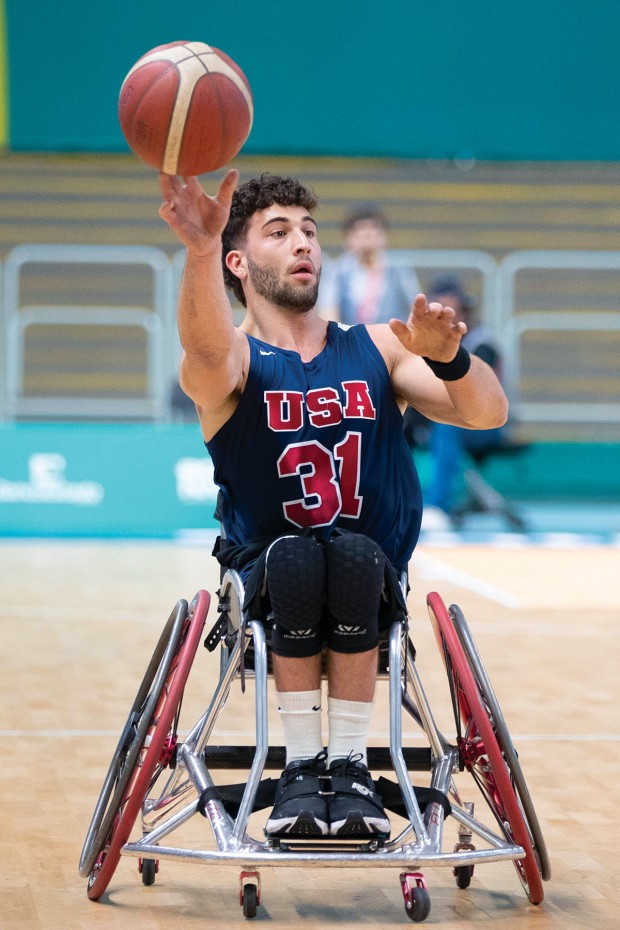
Peter is one of three college students who made the cut to compete for the 12 spots on Team USA in the 2024 Paralympics. (Photo: National Wheelchair Basketball Association)
“[Wheelchair basketball] kind of gave us back everything which had just been stripped from us,” Peter says. “The physical movement, the freedom of moving at a fast pace. We had played all the contact sports, and this gave us back that outlet for contact and physicality and aggression.”
Always team players, the Berry boys also appreciated the prospect of being part of a team again. “The camaraderie [within the TIRR Memorial Hermann Hotwheels team] was an added support group on top of all the support we were already receiving,” Peter says. “Once we got back to Houston, we took off [with basketball] and never looked back.”
At the time, nobody could have predicted the magnitude of the impact wheelchair basketball would have on the boys’ lives.
After graduating from The Emery/Weiner School in 2021 and 2020, the brothers both received full scholarships to The University of Alabama to play on their wheelchair basketball team, which is ranked number two in the country. Their younger sister Willa recently joined them in Tuscaloosa as a freshman.
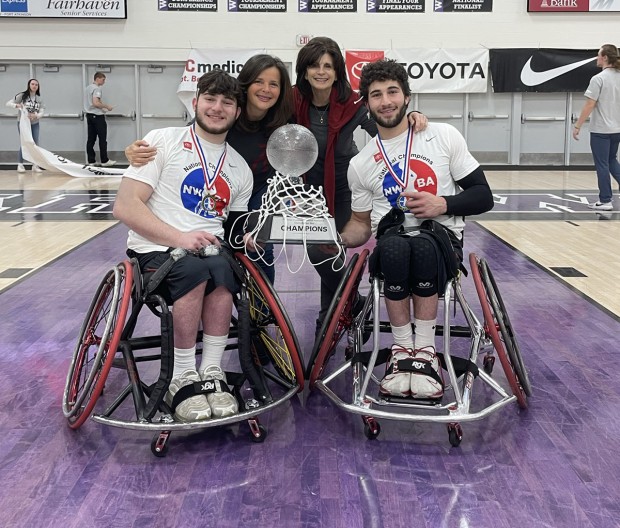
SUPPORT SYSTEM Pictured, after The University of Alabama wheelchair basketball team won the final championship game in March 2023, is (from left) Aaron Berry, Simone Berry, Moira Morris (Simone’s mom, who has been an incredible source of support for the children), and Peter Berry.
But Bama is yet another springboard for Peter. At the writing of this story, he is one of 16 athletes who made the cut to compete for 12 spots on Team USA in the 2024 Paralympics in Paris, Aug. 28-Sept. 8. The four not chosen will act as reserves in the event someone on the team is unable to play. He’s one of three college students; the other two, friends of Peter’s, attend the University of Wisconsin-Whitewater. “It’s funny,” Peter laughs, “when we see each other on the court, we’re talking so much trash, but then here we could be teammates. It’s a weird energy.”
The others vying for spots on the team range in age from 24 to 37. “It’s pretty competitive trying out and dealing with so much experience on the court,” Peter says. “I’m learning to play with guys who have been playing since before I was born.” The pace is faster, the players are stronger. Similar to the transition from high school play to college play, Peter says, “There’s more to lose, and there’s more to win.”
Of course, there’s no guarantee Peter will be selected for the final team, but his outlook, characteristic for him, is one of gratitude. “I have to be grateful no matter what the results might be,” he says. “This gives me plenty of opportunity to hone my skills and be ready for the next thing…” which could be the 2028 Paralympics in Los Angeles.
The second round of tryouts for Team USA is scheduled for the last weekend of March. Peter’s take: “I’m hoping to stay on for Paris. But we’ll see.” His former Little League coach’s take: “He’ll make it. I’m sure of it.”
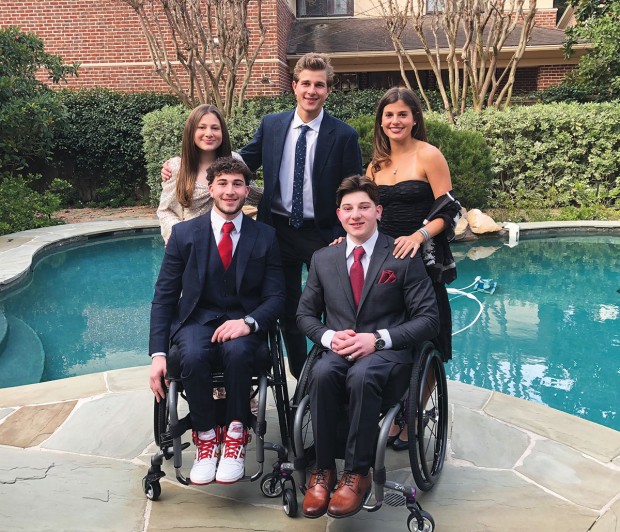
Gathered before the 2020 Houston Sports Awards, where Peter received the Insperity Inspiration Award, are (top row, from left) Willa Berry, Noah Berry, and Misha Berry; (bottom row, from left) Peter Berry and Aaron Berry.
“At the end of the day, the things that turned me into the player I am now, the things I was learning at 11 and 12 [years old], are the same things we’re doing now,” he says thoughtfully.
“We’re so gifted to have such a beautiful platform here at Bama,” Peter says. “The standard is so high for athletes here, and we are in the mecca for adaptive sports anywhere in the country.” The University of Alabama’s Adapted Athletics program has earned 21 national championship titles across all sports since it started in 2003 with women’s wheelchair basketball. Peter’s hope is that the perception of adaptive sports catches up with the reality. “I hope we’re making people more aware – we’re putting in just as many hours as our able-bodied counterparts. We’re making sure we’re not dipping or falling behind.
“It’s important to never take your foot off the gas, because there’s always someone looking to take your spot.”
Is wheelchair basketball as rough as it looks? Peter considers the question and says, “Yeah, you could say that. It’s kind of like a mix of NASCAR and football with basketball. If you sit close enough to the floor you can quite literally smell the burnt rubber from when we hit each other.”
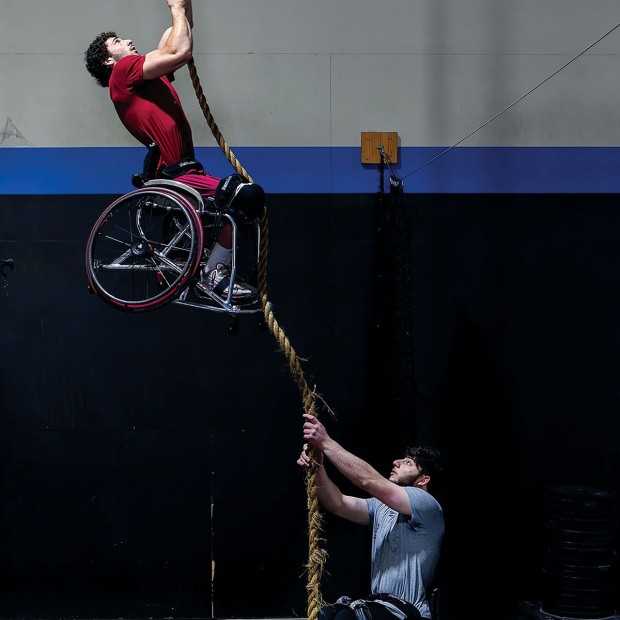
STRENGTH Training involves more than 20 hours of practice each week, said Peter. Wheelchair basketball requires upper body strength, so it can be “really intense,” he said. (Photo: Sports Illustrated)
And there are a lot of run-ins on the court. Flipping over in the chairs, athletes are expected to be able to right themselves in quick succession. “If you flip over,” Peter says, “the refs will never stop the game.
“It’s like a dance. It’s so meticulous, such a unique skill set you have to have. On top of that, you’re only using your upper body, so you’re using the same muscles over and over. It’s really intense.”
Training involves more than a “solid 20 hours” of practice. There’s weightlifting, individual shooting practice, plus all the therapeutic resources the university offers: massage, cupping. “All of that goes into it.” But Peter says the support outshines the pressure. “The program is so family oriented. We walk in every day and I’m grateful to be surrounded by people so invested in my success. That’s the biggest deal for me.”
Peter thinks about the commitment he’s taken on. “You get used to being sore,” he says. “The biggest challenge is definitely mental. Being able to balance so many commitments at once. You can’t play if you’re not getting good grades. But you can’t perform if you’re not practicing. And you can’t play or perform if you’re not healthy, and part of that is maintaining a social life.
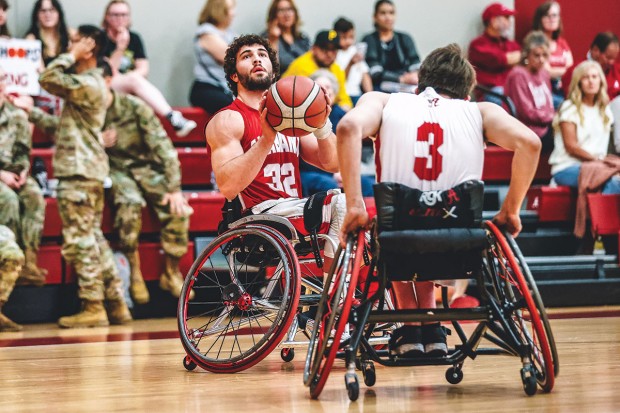
FOCUS AND DETERMINATION In games, at practice, and in life, Peter Berry gives his all. He and his brother, Aaron Berry, both received full scholarships to The University of Alabama to play for their top-ranked wheelchair basketball program. Pictured is Peter playing at a University of Alabama game. (Photo: Kyla Michelitch, Alabama Adapted Athletics)
“To be honest, it’s not so different from learning how to work a job and pay rent and spend time with your family. You just start a little earlier when you’re doing this in college. These are skills we can carry with us the rest of our lives.”
While Peter does see wheelchair basketball in his foreseeable future, he says it’s not the end game. The plan is to graduate this May and stay in Tuscaloosa to earn a master’s degree in marketing, and to keep playing basketball. “I’m taking time to figure out what that might look like,” Peter says, adding that he recently took the LSAT and might like to go into entertainment law.
Before that, Peter’s entertaining thoughts of playing professionally in Europe, where the athletes earn a little more money than they would in the states. “Only it’s not a career choice,” Peter says. “The goal is to go and train, maybe for 2028 [Paralympics], and live it out and see how far I can take it. Ultimately, having a good job and supporting my family, that’s the end goal.”
Peter is quick to thank everyone around him. “Simone and Uncle Matt [Berry] are the definition of doing the right thing and my biggest role models,” Peter says of the aunt and uncle who raised him, his brother, and his sister alongside their children Noah and Misha. “My family in general are my mentors,” he says. “And my teammates and coaches for sure. There’s my blood family and my family here at Bama. They give me the resources to learn and figure things out on my own, and after that, I take a lot of pride in figuring it out and adapting and persevering.”
With or without a spot on this year’s 2024 Paralympic Team USA, Peter Berry the young leader has grown into Peter Berry the young rockstar. And at home in Houston, we’ll keep cheering.
Editor’s note: For more on the Berry family, read Remembering Robin and Joshua Berry by Andria Dilling, Aug. 2011, and Enough Lives: Berry family fights distracted driving by Andria Dilling, May 2017.
Want more buzz like this? Sign up for our Morning Buzz emails.
To leave a comment, please log in or create an account with The Buzz Magazines, Disqus, Facebook, or Twitter. Or you may post as a guest.


